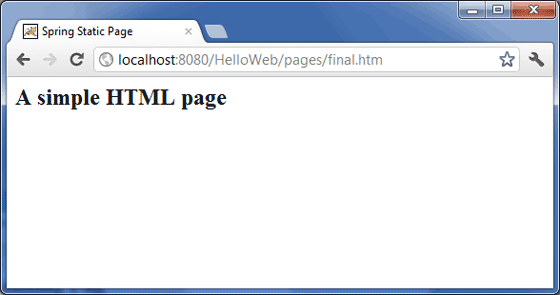SpringMVC-静的ページの例
次の例は、Spring MVC Frameworkを使用して単純なWebベースのアプリケーションを作成する方法を示しています。このアプリケーションは、静的ページと動的ページにアクセスできます。 <mvc:resources> 鬼ごっこ。
まず、動作するEclipse IDEを配置し、次の手順に従って、Spring WebFrameworkを使用して動的フォームベースのWebアプリケーションを開発しましょう。
| ステップ | 説明 |
|---|---|
| 1 | Spring MVC-Hello Worldの章で説明されているように、パッケージcom.tutorialspointの下にHelloWebという名前のプロジェクトを作成します。 |
| 2 | com.tutorialspointパッケージの下にJavaクラスWebControllerを作成します。 |
| 3 | 静的ファイルを作成する final.htm jspサブフォルダーの下。 |
| 4 | 以下に示すように、WebContent / WEB-INFフォルダーの下にあるSpring構成ファイルHelloWeb-servlet.xmlを更新します。 |
| 5 | 最後のステップは、ソースファイルと構成ファイルのコンテンツを作成し、アプリケーションをエクスポートすることです。これについては、以下で説明します。 |
WebController.java
package com.tutorialspoint;
import org.springframework.stereotype.Controller;
import org.springframework.web.bind.annotation.RequestMapping;
import org.springframework.web.bind.annotation.RequestMethod;
@Controller
public class WebController {
@RequestMapping(value = "/index", method = RequestMethod.GET)
public String index() {
return "index";
}
@RequestMapping(value = "/staticPage", method = RequestMethod.GET)
public String redirect() {
return "redirect:/pages/final.htm";
}
}HelloWeb-servlet.xml
<?xml version = "1.0" encoding = "UTF-8"?>
<beans xmlns = "http://www.springframework.org/schema/beans"
xmlns:xsi = " http://www.w3.org/2001/XMLSchema-instance"
xmlns:context = "http://www.springframework.org/schema/context"
xmlns:mvc = "http://www.springframework.org/schema/mvc"
xsi:schemaLocation = "http://www.springframework.org/schema/beans
http://www.springframework.org/schema/beans/spring-beans-2.5.xsd
http://www.springframework.org/schema/mvc
http://www.springframework.org/schema/mvc/spring-mvc-3.0.xsd
http://www.springframework.org/schema/context
http://www.springframework.org/schema/context/spring-context-3.0.xsd">
<context:component-scan base-package = "com.tutorialspoint" />
<bean id = "viewResolver" class = "org.springframework.web.servlet.view.InternalResourceViewResolver">
<property name = "prefix" value = "/WEB-INF/jsp/" />
<property name = "suffix" value = ".jsp" />
</bean>
<mvc:resources mapping = "/pages/**" location = "/WEB-INF/pages/" />
<mvc:annotation-driven/>
</beans>ここでは、 <mvc:resources..../>タグは静的ページをマップするために使用されています。マッピング属性はAnt patternこれは、httpリクエストのURLパターンを指定します。location属性は、画像、スタイルシート、JavaScript、およびその他の静的コンテンツを含む静的ページを持つ1つ以上の有効なリソースディレクトリの場所を指定する必要があります。値のコンマ区切りリストを使用して、複数のリソースの場所を指定できます。
以下はSpringビューファイルの内容です WEB-INF/jsp/index.jsp。これはランディングページになります。このページは、にアクセスするためのリクエストを送信しますstaticPage service method、このリクエストをWEB-INF / pagesフォルダーにある静的ページにリダイレクトします。
index.jsp
<%@taglib uri = "http://www.springframework.org/tags/form" prefix = "form"%>
<html>
<head>
<title>Spring Landing Page</title>
</head>
<body>
<h2>Spring Landing Pag</h2>
<p>Click below button to get a simple HTML page</p>
<form:form method = "GET" action = "/HelloWeb/staticPage">
<table>
<tr>
<td>
<input type = "submit" value = "Get HTML Page"/>
</td>
</tr>
</table>
</form:form>
</body>
</html>final.htm
<html>
<head>
<title>Spring Static Page</title>
</head>
<body>
<h2>A simple HTML page</h2>
</body>
</html>ソースファイルと構成ファイルの作成が完了したら、アプリケーションをエクスポートします。アプリケーションを右クリックし、「エクスポート」→「WARファイル」オプションを使用して、HelloWeb.warファイルをTomcatのwebappsフォルダーに保存します。
ここで、Tomcatサーバーを起動し、標準のブラウザーを使用してwebappsフォルダーから他のWebページにアクセスできることを確認します。次に、URL – http:// localhost:8080 / HelloWeb / indexにアクセスしてみます。Spring Webアプリケーションで問題がなければ、次の画面が表示されます。

「HTMLページを取得」ボタンをクリックして、staticPageサービスメソッドに記載されている静的ページにアクセスします。Spring Webアプリケーションで問題がなければ、次の画面が表示されます。
